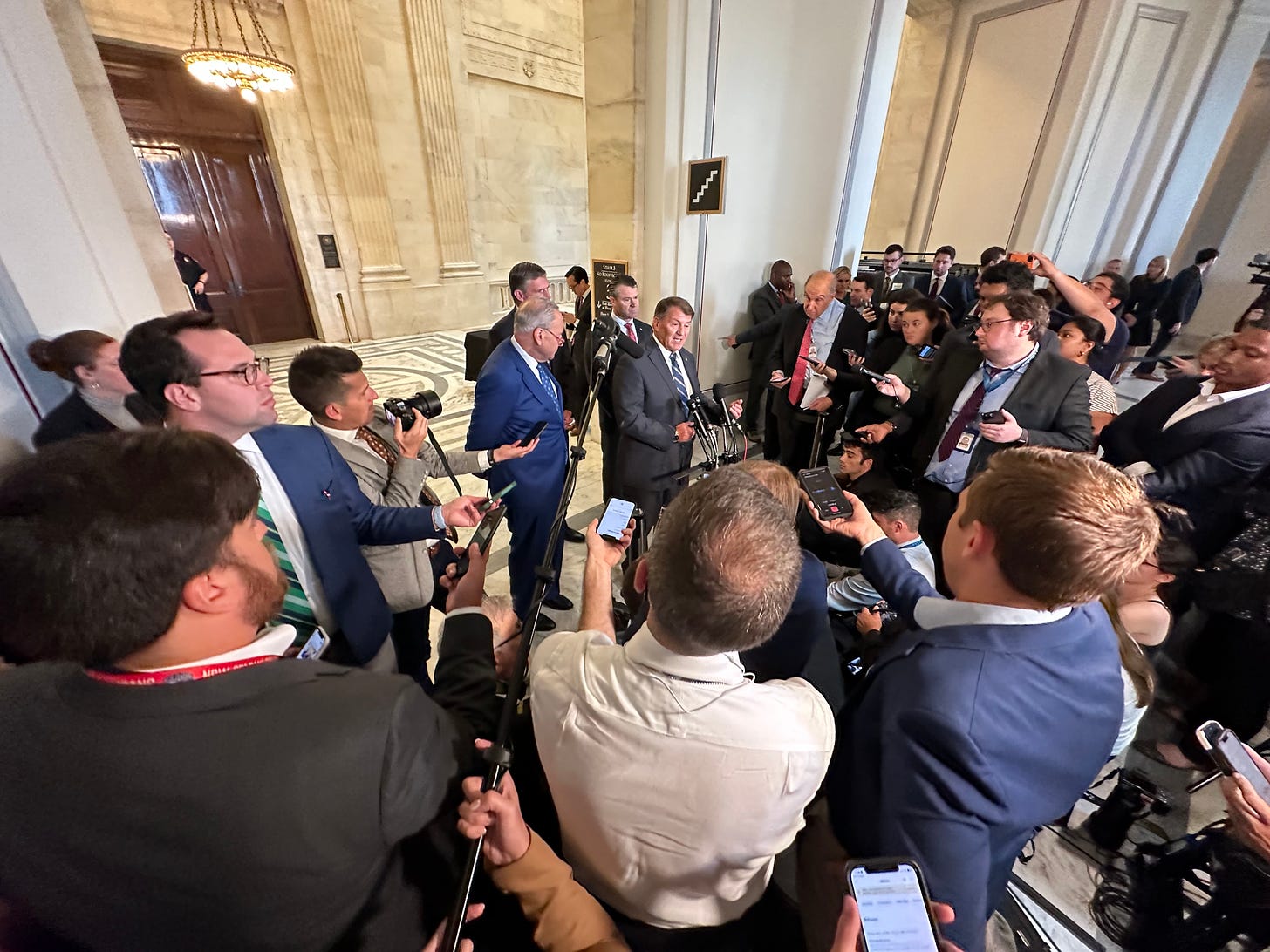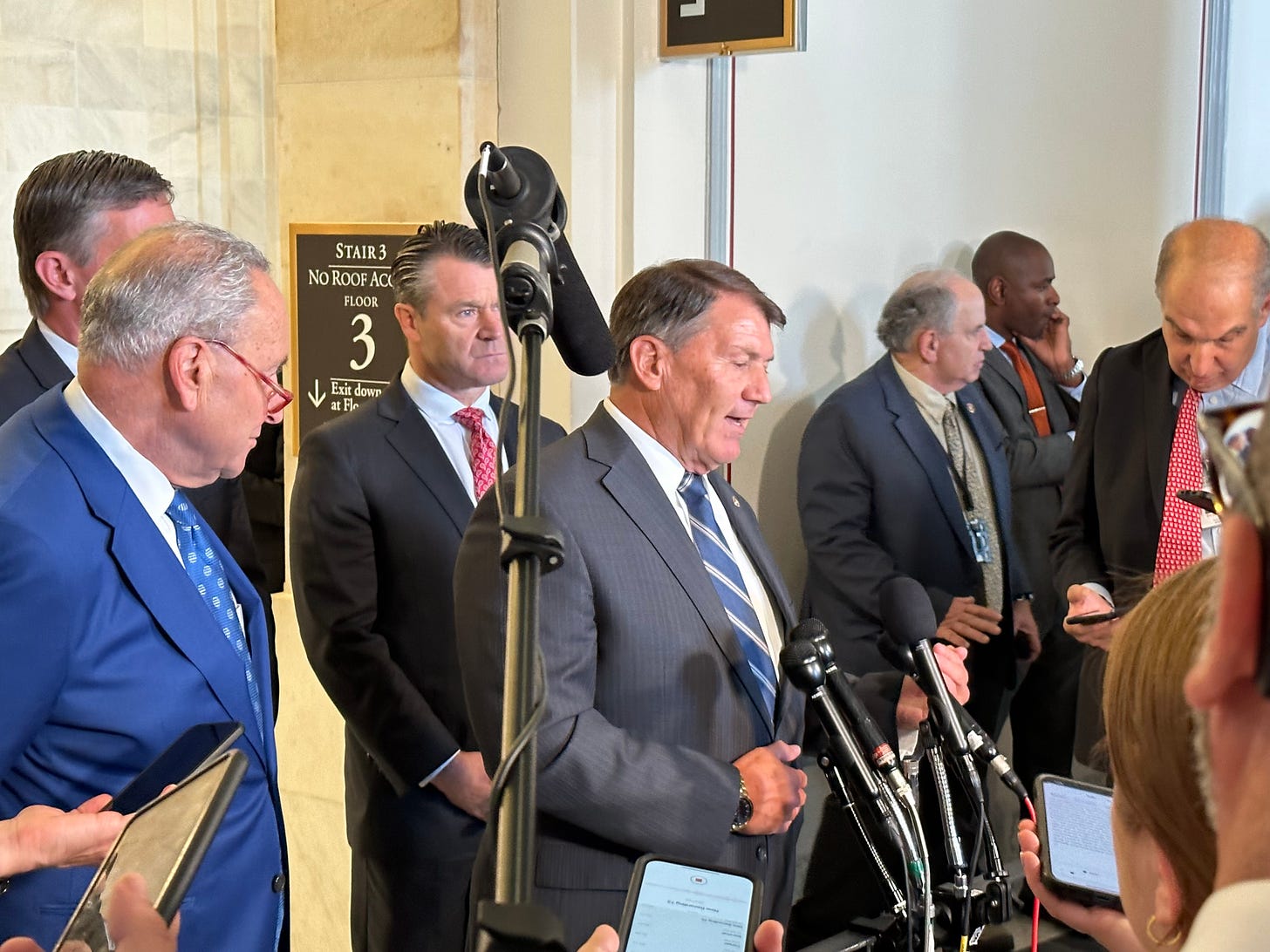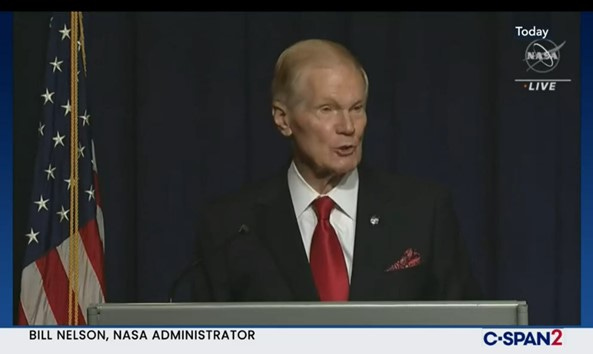Before being tapped to lead NASA, Administrator Bill Nelson served in the US Senate. Last week, Nelson turned many of his former Senate colleagues’ heads when he announced a new UAP (Unidentified Anomalous Phenomena or UFO) office but, initially, kept its director’s identity secret.
“That kind of surprised me,” Sen. Mike Rounds (R-SD) exclusively tells Ask a Pol. “I wasn’t sure why they would do that.”
NASA quickly backpedaled and revealed its new director of UAP research is Mark McInerney, who previously served as a liaison between NASA and the Pentagon “covering limited UAP activities for the agency.”
While he hasn’t yet, Rounds expects to discuss UAPs with his old Senate colleague, Nelson, sooner than later.*
At the end of July, the former South Dakota governor had a classified briefing with Dr. Sean Kirkpatrick, director of the All-domain Anomaly Resolution Office (AARO), which he previously told Ask a Pol he used to push for more UAP whistleblower protections.
In our interview this week, Rounds gives Ask a Pol a further glimpse into his thinking on UAPs.
“My concern from the Department of Defense is, I just don't simply want our ongoing programs disrupted or limited because of additional scrutiny on what we are doing and what our adversaries are doing in some very unique programs,” Sen. Rounds exclusively tells Ask a Pol.
Rounds is quick to add.
“These aren't new types of programs. They’re the types of programs that have always existed, stealth is a good example,” Rounds says.
Rounds is the lead Republican sponsor of Majority Leader Chuck Schumer’s UAP amendment that senators tacked on to their version of the National Defense Authorization Act (or NDAA), which still must be reconciled with the House-passed version in a formal conference committee.
While rumors are floating around Capitol Hill that House leaders are taking aim at some Senate-passed UAP measures in the NDAA, Rounds says those whispers are premature.
“I haven't heard anything. We'll get into conference, then we’ll sit down and work through all that. Maybe some of the items, once they hear the logic behind it, maybe they'll come around on it,” Rounds says.

For Rounds, the issue is as much retention-focused as it is transparency-focused.
“I just simply don't want to lose whatever historical data we've got out there,” Rounds says. “And, you know, just by happenstance it got lost in a warehouse someplace or lost in a filing cabinet someplace or just simply misplaced. So it would be better if we directed that data on this particular item of interest be put into a single filing location.”
As for whether the Senate has a strong case to make if there is pushback in the House?
“I hope so,” Rounds says. “At least let's focus on this so that folks that do have a concern about it, so we can at least show them a place where they can go to get good information on some of this stuff.”
*FUN—RANDOM—FACT: NASA administrator Bill Nelson visits the Capitol much more than other heads of federal agencies. He usually walks alone, not even accompanied by a security detail. Though every once in a while, Nelson is seen giving NASA astronauts personal tours of his old Senate stomping grounds.
Matt Laslo’s a veteran congressional correspondent, new media prof. and founder of Ask a Pol — the people-powered press corps.
Ask a Pol is a new, people-powered press corps, asking your lawmakers your questions at your US Capitol. Follow us on the socials @Ask_a_Pol (or @askpols on Insta).
For subscribers, below find a rough transcript of Ask a Pol’s interview with Sen. Mike Rounds, slightly edited for clarity.
Matt Laslo: “Curious your thoughts, last week NASA announces this new office of UAPs, but at first they said, ‘We're not going to name the director publicly.’ What did you make of it? I kinda took it as a slap…”
Mike Rounds: “That kind of surprised me.”
ML: “Right?”
MR: “I wasn’t sure why they would do that, so—then they quickly walked it back…”
ML: “And then they quickly walked it back…”
MR: “Yeah. I don't know why they did that.”
ML: “Because the sound and the fury I imagine it opened up.”
MR: “Look, we can have discussions about UAPs. I think most people are more than willing. You know, my concern from the Department of Defense is, I just don't simply want our ongoing programs disrupted or limited because of additional scrutiny on what we are doing and what our adversaries are doing in some very unique programs. And these aren't new types of programs. They’re the types of programs that have always existed, stealth is a good example.”
ML: “Are you glad NASA is now taking this seriously? Are you going to work with him on it?”
MR: “I don't know if they're simply responding to public interest. I have not had an opportunity to talk to the NASA administrator about it.”
ML: “Oh, you never worked with Nelson…”
MR: “Oh, yeah, I worked with him for a while. He was actually ranking member on the subcommittee for cyber. So no, we go back. I just haven't haven't seen him to have a conversation.”
ML: “You got a day job. Have you—I’ve heard some whispers that the House in the NDAA might try to take out some of the UAP language?”
MR: “I haven't heard anything at all.”
ML: “Premature?”
MR: “I haven't heard anything. We'll get into conference, then we’ll sit down and work through all that. Maybe some of the items, once they hear the logic behind it, maybe they'll come around on it.”
ML: “But especially, your measure with Schumer—Schumer’s gonna fight for that one?”
MR: “Well, this is one that, I just simply don't want to lose whatever historical data we've got out there, and, you know, just by happenstance it got lost in a warehouse someplace or lost in a filing cabinet someplace or just simply misplaced. So it would be better if we directed that data on this particular item of interest be put into a single filing location.”
ML: “Do you think the Senate has a really strong case to make to the House?”
MR: “I hope so. I mean, at least let's focus on this so that folks that do have a concern about it, so we can at least show them a place where they can go to get good information on some of this stuff.”
ML: “Yeah.”
MR: “Thanks man.”
ML: “Preciate ya.”
MR: “Yup, you bet.”

















Share this post